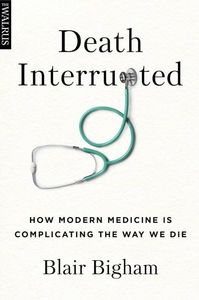Dr. Blair Bigham Explores "The Death Dilemma" that Emerges as Technology Blurs the Line Between Life and Death
The common idiom that there's "nothing certain except death and taxes" is beginning to feel a little less reliable in the current era, as we consider technologies existing, emerging, and imagined that begin to blur the line between life and death. From mechanical life support to those ideas still in the realm of science fiction (like consciousness uploading) the one truly universal human experience—death—no longer looks quite the same as it once did, and the conversations about what the end of life could and should look like are subsequently evolving.
Into these complex discussions comes ICU doctor Blair Bigham, whose fascinating new book Death Interrupted: How Modern Medicine Is Complicating the Way We Die (House of Anansi Press) is packed with first-hand experiences of the complications of death in our current medical settings.
Dr. Bigham delves into the thicket of choices created for patients, families, and doctors as the grey zone between death and life expands – choices which must often be made in situations where no choices previously existed. Acting as a kind of road map through these unprecedented decisions, Death Interrupted is a compassionate, wise exploration of end of life options, for ourselves and our loved ones, bringing in perspectives from palliative care professionals, social workers, ethicists, and others.
We're speaking to Dr. Bigham today about Death Interrupted and how his work in emergency rooms and ICUs sparked his interest in helping people navigate the ever-changing end of life experience.
He tells us about how getting his start as a paramedic shaped his journey, how writing the book changed some of his own thoughts around lifesaving care and extraordinary measures, and why he doesn't feel the courtroom is the right place to find solutions to "the death dilemma".
Open Book:
Tell us about your new book and how it came to be. What made you passionate about the subject matter you're exploring?
Blair Bigham:
This book is really a reflection of my journey providing lifesaving treatments to people on the brink of death. My romance with this unique type of medical practice started as a paramedic, where resuscitating people in the field aways felt like the right thing to do. As my training evolved into the emergency room and intensive care unit, resuscitation became a bit less black and white; there were still people who I could save with the use of technology, medicines, and wit, but then there were others who couldn’t be saved. This created a dilemma in my mind; at what point is a doctor to switch gears from resuscitation mode to tending to suffering as someone dies?
OB:
Is there a question that is central to your book? And if so, is it the same question you were thinking about when you started writing or did it change during the writing process?
BB:
The question didn’t change, but my expected answer did. When I started writing, I thought the answer was more palliation, less aggressive measures. But as I evolved in both the process of writing the book and being placed at Stanford University, a hospital that goes to the ends of the earth to keep people alive, I realized that my own ability to predict outcomes was surprisingly poor; people who I thought would die occasionally lived, and that was very unsettling.
OB:
What was your research process like for this book? Did you encounter anything unexpected while you were researching?
Your CanLit News
Subscribe to Open Book’s newsletter to get local book events, literary content, writing tips, and more in your inbox
BB:
My plan was to interview as many experts as I could, particularly people who were not physicians, to see if I could better understand this tension we seem to perpetuate by giving unrealistic hope – I won’t call it false hope, although there are times when false hope is clearly at play. Despite our sometimes-ill-equipped ability to prognosticate, we can still be more clear and realistic in communicating with families. But then, by communicating honestly, we must guard against creating a self-fulfilling prophecy whereby a bag prognosis leads to withdrawal of medical science, locking in someone’s fate.
OB:
What do you love about writing nonfiction? What are some of the strengths of the genre, in your opinion?
BB:
I’m not sure there is much of a line between medical fiction and medical nonfiction. The wildest things happen in the human body, and even the most fictional tales have likely been played out in real life. What we get to do as non-fiction writers is bring context and cohesion to these wild medical experiences, real or imaginary. In medicine, we are always go-go-go trying to keep our heads above water. Nonfiction allows us to slow down and understand more about our day to day rat race.
OB:
What do you need in order to write – in terms of space, food, rituals, writing instruments?
BB:
A deadline always helps, but mostly just making time on a day off. Writing after a shift or when you wake up from a string of nights is hard. You need to be well rested, which isn’t an easy condition to meet when you’re an acute care physician in the middle of a pandemic.
OB:
A lot of nonfiction prizes and anthologies have expanded to welcome more personal nonfiction as well as strictly research-based nonfiction. What do you think of this shift within the genre?
BB:
Research without contextualization can be misleading. As a scientist, I have an appreciation for the limitations of research and the difficulties in interpreting results. It’s not black and white most of the time. Being able to piece research into the puzzle of clinical practice is where the real value of scientific exploration becomes beneficial to society.
OB:
Do you remember the first moment you began to consider writing this book? Was there an inciting incident that kicked off the process for you?
BB:
I was sitting in a courtroom on assignment for The Walrus magazine. It was a trial about a brain dead woman whose family was contesting the diagnosis. It was such a painful and awkward experience, I knew then that the courts were the last place to find a solution to the death dilemma.
OB:
What are you working on now?
BB:
When I’m not in the hospital I spend a lot of time teaching science communication skills. You don’t have to be an author or journalist to be a great science communicator, and like all things in medicine, it’s a skill that requires study, coaching and practice. I’m also digging into some interesting questions for my next book!
_______________________________________
Dr. Blair Bigham is a journalist, scientist, and attending emergency and ICU physician who trained at McMaster and Stanford Universities. He was a Global Journalism Fellow at the Munk School of Global Affairs and Public Policy and an associate scientist at St. Michael’s Hospital. His work has appeared in the Toronto Star, the Globe and Mail, the New England Journal of Medicine, and the Canadian Medical Association Journal, among others.





